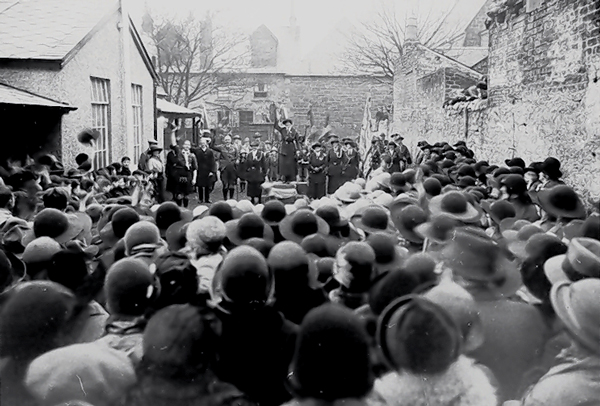ONE hundred years ago a Mr Lyle got together a patrol of local Helensburgh lads and formed the 1st Craigendoran Scouts.
It appears that this was quickly followed by groups from the middle of town and Larchfield School, and by the end of the First World War Helensburgh had a thriving Scout movement with both Scouts (aged 11-18) and the new Wolf Cubs (8-11).
Today our successor group, the First Helensburgh together with the Helensburgh Explorer Unit, offers Scouting to around 100 young people from aged six upwards.
Waiting lists for the younger sections are full and our numbers are artificially constrained by a lack of adult leaders. Overall we are part of a movement that is expanding, not only in Scotland and the UK, but worldwide. Currently there are over 38 million Scouts in the world.
How different is Scouting today? In appearance the change has been substantial with only the “scout scarf” still retaining its place. Outward manifestations like Church Parades and Scout Bands are now rare but, in essence, the core of Scouting remains the same.
The central vision of the founder was that young people love adventure and challenge and, with guidance, will learn through it to become better, more fulfilled individuals and citizens.
The most popular activity, camping, for example both provides adventure and develops abilities to plan menus, buy food, work with contemporaries and survive discomfort.
Adventure will, of course, vary dramatically with age. To the six year-old, the first night away from Mummy with his/her friends is both exciting and not a little stressful. To the nine year-old cooking dinner over an open fire is real adventure.
By 13 the overnight trek, carrying all their own food and gear is the challenge, and by 17 this has progressed to 100 miles in a foreign country like Serbia, with 20 additional challenges from sleeping in castles to eating with local families.
At the age of 20 the big adventure might be working in an International Jamboree for 20,000 in Japan or using Via Ferrata on a multi-hut trip in the Italian Alps. That is Scouting today.
The demand for Outdoor Activity such as these has never been greater. Unfortunately this has been paralleled by increasing demands from insurers and government, that the young are as completely protected from harm as possible.
The old days of the troop simply going for a midnight hike up Ben Lomond have long gone, and all our leaders need to be qualified and authorised to lead adventurous activities, including Camping.
The movement provides or will help fund such training, but time demands on a young leader with small children are already acute — with summer camp taking up limited holidays — and extra weekends for Training rather than Scouting are not welcome.
Sadly, without the adventure, the older age groups will drift away and much of the best of Scouting will be lost.
One area of adventure that is only limited by the time availability of the leader, is International activity. A trip to an international camp is an unforgettable experience. Linked with home hospitality the benefits for both individuals and society at large can be immense.
As Scouts progress through the ages, the focus gradually shifts from learning to be independent to taking responsibility for others and then Service to the community.
Learning the pleasure from undertaking voluntary service is one of the great lessons provided by the Scouts.
Jamborees are international activity camps which range in size from 1,000 to 35,000 participants. Around 20% of the camp will be volunteers aged 18 plus who undertake all the jobs from cleaning the toilets to teaching canoeing.
It is simply amazing to outsiders that a young person will pay a camp fee for the pleasure of cleaning toilets, until one has experienced the camaraderie and sheer pleasure of service.
The idea of “duty” is central to the Scout Promise and helping others is part of the programme of all age groups. Similarly the movement actively promotes the idea of responsibility for the environment — although, it must be said, not as strongly as some continental Scout associations.
Although not a “religious” or Christian organisation, older Scouts in particular, are expected to reflect on their place in the world and their duties as individuals. We actively encourage those with religious commitments and lay aside short periods for reflection or prayer in meetings or camps.
We are lucky in this town in having excellent resources and a superb set of leaders. We do however need more adults to enable all the youngsters who want to, a chance to try Scouting.
We know not all of them — or adults for that matter — will enjoy the outdoor life, but we also know that it can provide some of the best experiences anyone could wish for.
We are confident that over the next 100 years our Scout Group will grow and continue to have an important role in the lives of the young people of this town.





